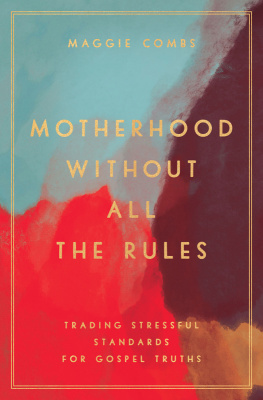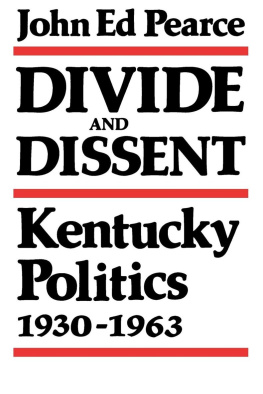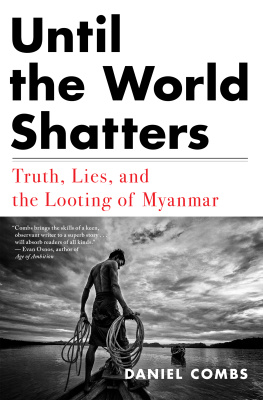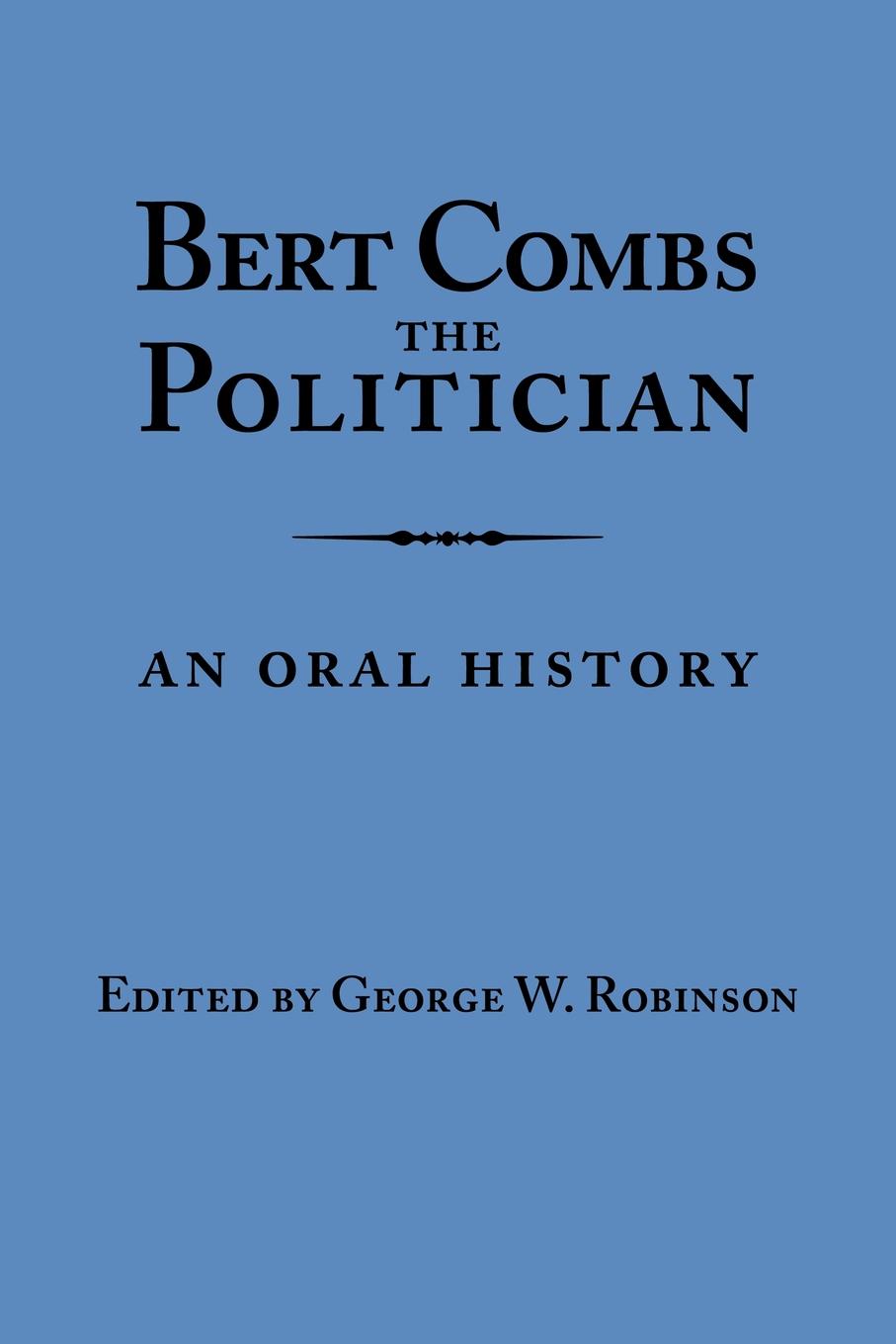Kentucky Remembered
An Oral History Series
JAMES C. KLOTTER and
TERRY L. BIRDWHISTELL
General Editors
Bert Combs the Politician
An Oral History
George W. Robinson, Editor

Paperback edition 2008
Copyright 1991 by The University Press of Kentucky
Scholarly publisher for the Commonwealth,
serving Bellarmine University, Berea College, Centre
College of Kentucky, Eastern Kentucky University,
The Filson Historical Society, Georgetown College,
Kentucky Historical Society, Kentucky State University,
Morehead State University, Murray State University,
Northern Kentucky University, Transylvania University,
University of Kentucky, University of Louisville,
and Western Kentucky University.
All rights reserved.
Editorial and Sales Offices: The University Press of Kentucky
663 South Limestone Street, Lexington, Kentucky 40508-4008
www.kentuckypress.com
The Library of Congress has cataloged the hardcover edition as follows:
Bert Combs the politician : an oral history / George W. Robinson, editor.
p. cm.(Kentucky remembered : an oral history series)
Includes bibliographical references and index.
ISBN-10: 0-8131-1740-2
ISBN-13: 978-0-8131-1740-9 (hardcover : alk. paper)
1. Combs, Bert T., 1911 Interviews. 2. GovernorsKentucky
Interviews. 3. KentuckyPolitics and government1951 I. Robinson,
George William, 1926 . II. Series.
F456.26.C66B47 1991
976.9'043'092dc20
[B] 90-19970
ISBN-13: 978-0-8131-9229-1 (pbk. : alk. paper)
This book is printed on acid-free recycled paper meeting
the requirements of the American National Standard
for Permanence in Paper for Printed Library Materials.

Manufactured in the United States of America.

| Member of the Association of
American University Presses |
Contents
General Editors Preface
Kentucky is a national leader in the field of oral history, and over the past decades thousands of interviews have been collected. Kentucky Remembered is designed to bring into print the most important of those recollections. Each volume focuses on a particular subject and is prepared by an expert in that field.
Oral history is, of course, only one type of source material, but by its very nature it provides insights into the personal and hidden aspects of history. It lets readers experience the full range of the drama that is involved in the historical story. Oral sources provide a vital thread to the rich fabric that is Kentuckys history.
This volume is the first in the series and amply demonstrates the value of oral history. In studying one of the states most important governors of the twentieth century, George Robinson of Eastern Kentucky University has skillfully selected from a large number of interviews the most pertinent parts and has fashioned them into a fascinating narrative. Each person, including Bert Combs himself, adds details and examples to the existing story. New insights into Kentuckys politics and people emerge on almost every page. Here, too, are the sound and the furyand the humorthat traditionally have been a part of the states political past. In short, Bert Combs the Politician is a fresh story, one to be savored and enjoyed.
James C. Klotter
Terry L. Birdwhistell
Preface
The Bert Combs oral history project from which these excerpts have been taken was completed between 1978 and 1980. A grant from the Kentucky Oral History Commission provided funds for travel and equipment used. Professor William Ellis of Eastern Kentucky University assisted me with the interviews, conducting approximately one-fourth of them, while Professor William Berge, then director of the Oral History Center at Eastern Kentucky University helped guide us both in our efforts.
My interest in Combs stemmed from work I did between 1974 and 1980 preparing his gubernatorial papers for publication. Impressed by the extent and breadth of the Combs program and by his personal identification with so much of it, I found myself wanting to know more and more about his life outside gubernatorial circumstances. For example, how had he prepared himself for the responsibilities of public office? How did his contemporaries evaluate his performance, his personality, his intellect, his honesty? Was Kentucky different because of Combs? Did politics change Combs?
Motivated by these and other questions and intrigued by the evolution of oral history as both an investigative and preservationist approach to historical understanding, I concluded that an oral history project would be an appropriate approach. Combs was agreeable to such a study. I had in hand a long list of Combs acquaintances. William Berge was there to help me draft a project request and William Ellis, who was doing research in Kentucky history anyway, agreed to help me with some of the interviews.
It is important to stress that I did not embark upon the project with a specific goal of publication in mind. I had no thesis to prove or disprove. All I wished to do was to preserve on tape as much information about Combs as possible. I did not expect to find out everything, nor did I really know at the beginning what direction the interviews would take. Some patterns emerged quickly, however, and a general formula developed. An outline was prepared, and then questions were designed to prompt as broad a series of responses as possible, so that future researchers might find something useful to enhance their knowledge of twentieth-century Kentucky history.
More than sixty people were interviewed, some more than once, and Bert Combs, himself, eleven times. The selections here are drawn from the recollections of more than fifty people. Each tape includes questions and responses, but the questions have been deleted from these reproductions to conserve space. In some instances there have been slight changes in the spoken word, but in no case is the expressed meaning altered. It is worth noting, also, that what appears here is but a small percentage (no more than 10 percent) of what each participant contributed. The complete record on tape is currently housed in the Eastern Kentucky University Archives and is available to the public.
Excerpts that appear were chosen because they touched upon important aspects of Combss career, revealed his character, exemplified personality traits, and suggested reasons for his actions. They also frequently showed the interests and rationale of the interviewee.
The organization is broadly chronological, encompassing five chapters. In examines the years after the governorship, culminating with the gubernatorial primary in 1971.
Like most historical studies there is a sense of incompleteness about this one. Although no one rejected the opportunity to participate, contributions from certain key players are missing. In particular, Earle Clements, Wendell Ford, Joe Leary, Henry Ward, Ned Breathitt, and John Whisman proved to be unavailable. Their comments would have enriched the total product.













